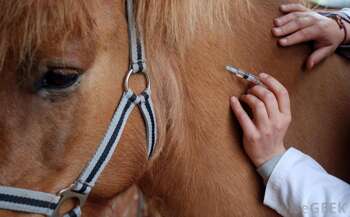How effective is your Tetanus Booster?
Horses are without doubt, the most vaccinated domesticated animals on the planet - worming, strangles, tetanus, equine influenze, Hendra..... the list goes on!!
But where's the science to support that so much vaccination is the answer to maintain a healthy horse? Vet's tend to recommend what sceience they have to hand or worse sometimes whatever the manufacturere has recommended - but when you delve into the science performed by the manufacturer, it tends to be very loose - and sometimes outdated (or maybe even manufactured as well).
A recent study in the UK on the effectiveness of Tetanus Boosters calls for a review of Tetanus booster recommendations as their findings were that after 3 vaccinations, the horse had full immunity antibodies for over 3 years following! Currently Tetanus is considered a yearly booster.
In the study, the horses received the first vaccination at age 5–11 months, and the second dose 4 weeks later. A third vaccine dose was given 15–17 months after the second dose. The results showed that every horse still in their test cycle (some were sold/moved on etc) after 3 years still had full immunity. Their conclusion was that horses that undergo basic immunisation with 3 doses of vaccine after age 5 months are likely to have serum antibody titres consistent with protection against tetanus for more than 3 years.
They recommended that current guidelines for tetanus prophylaxis should be revised.
There are many adverse reactions to Vaccinations - and "we’re talking about more than just immediate hypersensitivity reactions such as redness and inflammation. Clinical signs associated with reactions typically include fever, stiffness, sore joints and abdominal tenderness, susceptibility to infections, neurological disorders including seizures and encephalitis, collapse with autoagglutinated red blood cells and jaundice (autoimmune hemolytic anemia, AIHA), or generalized pin point or blotchy hemorrhages (immune-mediated thrombocytopenia, ITP) and lamintis. Liver and kidney laboratory values may be significantly elevated, and liver or kidney failure may occur by itself or accompany bone marrow suppression" (W.Jean Dodds DVM - US)
As a horse owner, it's a difficult thing to know what the right thing to do is as far as vaccinations. We'd like to take the advice of the vet (but if this is coming from the manufacturer for increased sales and dubious science - well... maybe not) but the risks can be devastating if we get it wrong.
If you have a concern regarding your vaccination program, you should speak to your vet and you can find a link to the study and findings below.
References:
Duration of tetanus immunoglobulin G titres following basic immunisation of horses
Article first published online: 20 SEP 2015
DOI: 10.1111/evj.12502 Article

